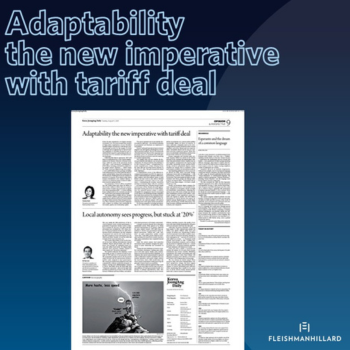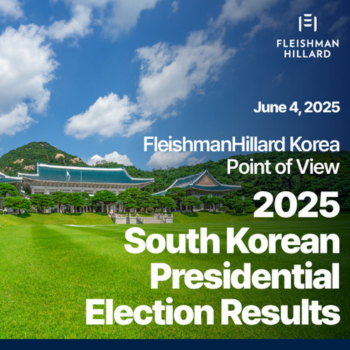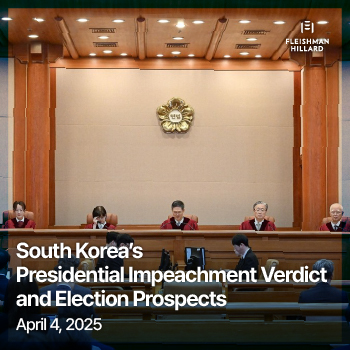[FH] 2024 South Korea General Election Newsletter

On 10 April 2024, the general election to elect 300 members of the 22nd National Assembly of the Republic of Korea ended with a landslide victory for the opposition party. As a result, the Democratic Party of Korea has been the majority party in the National Assembly for three consecutive years after the 20th, 21st and 22nd elections. The Yoon Administration and the People Power Party, the minority party in the legislature, aimed to win the majority through this election, but ultimately failed. President Yoon has become the first president in the history of the constitution with a ruling party that has failed to secure a majority throughout the President’s five-year term. There were several turning points during the campaigns, but these results were largely expected. In a democratic country, elections are an act that affirms that the sovereignty of the country lies with the people. The people express their will by choosing to vote and give instructions to the government and the National Assembly. We looked at the will of the people and the public opinion expressed through this election and summarized the future outlook and implications from political, economic and social change perspective after the election.
22nd General Election
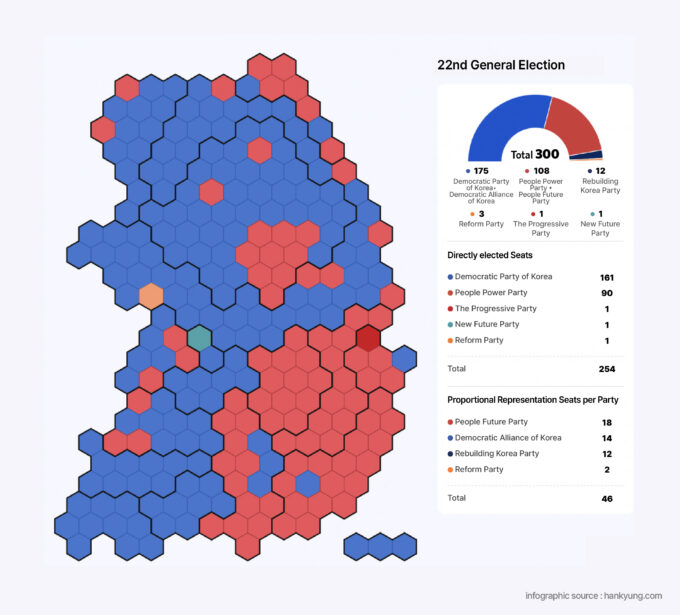
Number of Seats in National Assembly
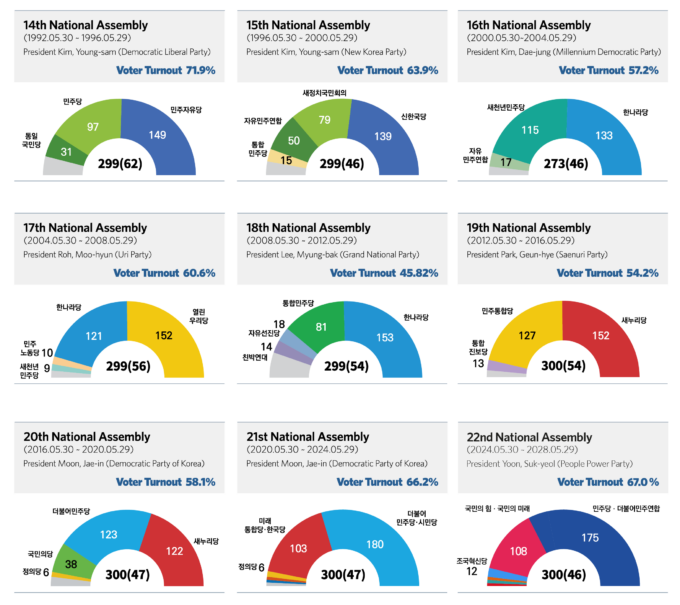
General Election Voter Turnout (in%)
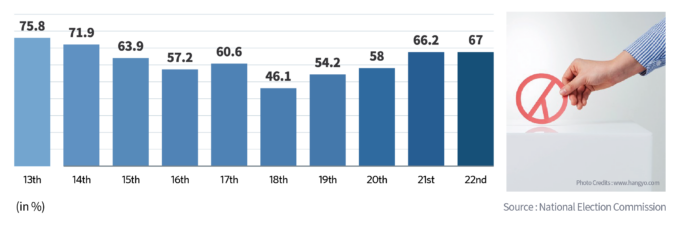

FleishmanHillard Korea has analyzed the major platforms of the two main political parties leading up to the April 10 General Election, the Democratic Party of Korea and the People Power Party.
Whether you are a Korean company, a global company operating in Korea, or a global company considering entering the Korean market, we hope that this will enhance your understanding of the potential impact of the two parties’ platforms on your business and your communications strategies to help you formulate a successful policy response strategy.
We show the campaign pledges below, most of which will require legislation or amendments of current laws. Now, with its election victory, the pledges of the Democratic Party are more likely to be implemented through legislation.
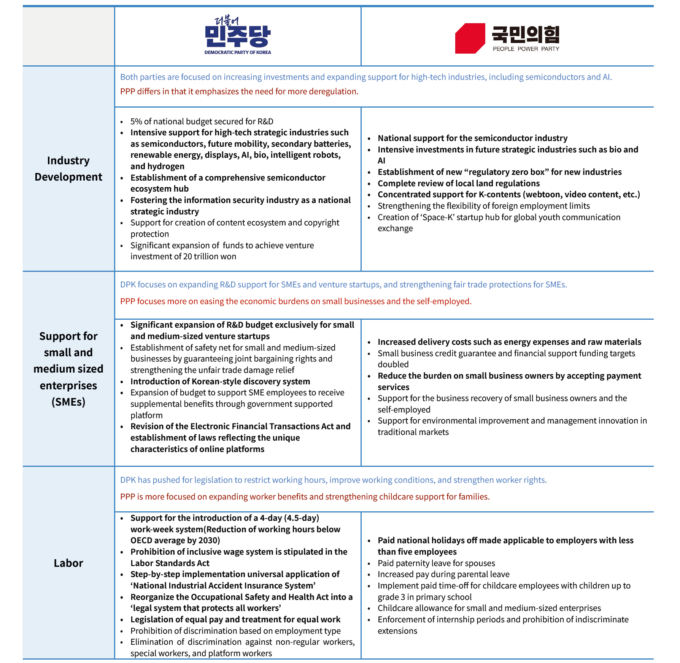
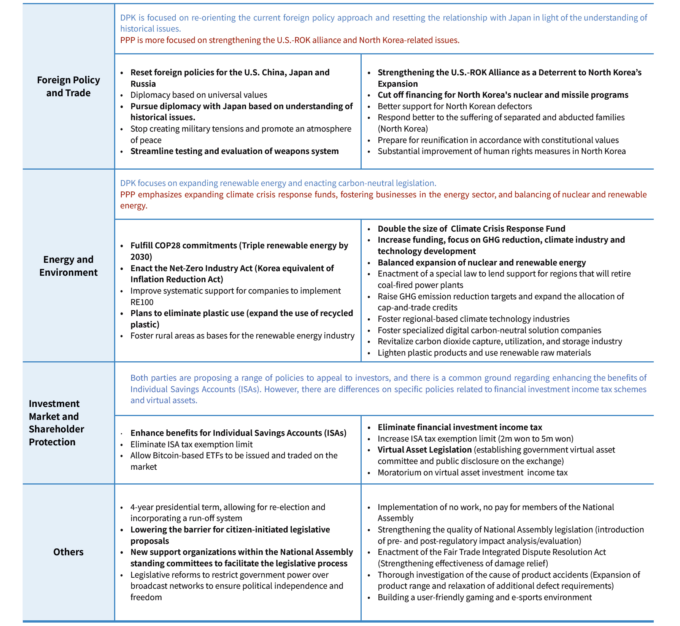
*Source: Excerpts from policy announcement publications of both parties and press reports related to major policies promoted by each party, etc.

1. Judgment rendered against the current government
The key word in this election was ‘judgment.’ The ruling party and the opposition party clashed over which party deserved to face judgment by the voters, and it ended in a landslide victory for the opposition party.
The opposition had its share of problems. The controversy over the ‘massacres’ erupted as many political veterans failed to secure party nominations. Several candidates were mired in personal scandals. But the dislike of the government and the ruling party determined the final outcome. Why did the ruling party, which had won the presidential and local elections for the past two years, suffer such a crushing defeat? Firstly, policy troubles in managing consumer prices led to people’s sense of economic difficulties. Scandals involving first lady Kim Kun-hee, Korean ambassador to Australia Lee Jong-seop and senior secretary Hwang Sang-moo added fuel to the fire. Above all, Yoon Administration’s hostility to the opposition party and the refusal to admit mistakes in various areas including personnel appointments were seen as arrogance.
2. The country belongs to the people
This election has clearly shown that the people are in control, making their ‘judgment’ in anger.
We saw a proof of this in the highest rate of early voting in the history of general elections (31.3%) and the highest total voter turnout in 32 years (67%). The commitment of the people to the election was not only about bringing judgment to the government and the ruling party, but also the opposition party. The opposition party should not forget that this result came about not because it did well, but because the ruling party did poorly. The elected officials must understand the uncomfortable truth about voter sentiments and the heavy hearts of the voters who chose what they perceived as the lesser evil because they had no other choices. This voter sentiment in this election should be taken as a lesson not only by the defeated ruling party but also by the victorious opposition party.
3. From division and conflict to integration and cooperation
The proportional representation ballot paper for this general election was 51.7 cm long, the longest in history, as no less than 38 political parties registered for the election. The emergence of so many political parties also means that there is a lot to be said about the existing political state. Since many feel that the existing political parties did not represent them properly, they are creating their own parties and entering politics. However, only two parties, the People Power Party and the Democratic Party of Korea, were able to win more than 20 seats. This is probably the result of voters feeling that they do not want their votes to be wasted on smaller third parties.
The campaigns have been unusually negative, with the parties criticizing each other heavily, and an unprecedented number of unrealistic promises being made in return for votes. However, the mission that the voters gave to this 22nd National Assembly was “integration and cooperation.” This mandate must be implemented, starting with the leadership of the ruling and opposition parties. It seems that the President has no choice but to agree to meetings between the leaders of the ruling and opposition parties, which has never happened since his inauguration two years ago. The legislative and executive branches must walk towards a new path of cooperation through dialogue and compromise. Additionally, the citizens’ role in participation, monitoring and supporting of the political process will become ever more crucial.
President Yoon Seok-yeol has announced that he would begin to reform the current state affairs in accordance with the will of the people. In addition to the official statement that “the president’s intention is to establish close cooperation and communication with the opposition party,” Prime Minister Han Duk-soo and Chief of Presidential Staff Lee Kwan-seop, also tendered their resignations. The hope is that this major personnel reshuffle will lead
to a successful reset.
Bills that have not been processed by the 21st National Assembly will be automatically discarded on 30 May. Of the 223 bills on regulatory innovation, 98 have not been processed. With about a month left before the end of the 21st National Assembly’s term. There is no time to waste.

1. Extreme confrontation and heated political conflict between the ruling and opposition parties
The Democratic Party, which holds the majority of total 300 seats in the National Assembly, will seek to exercise its legislative power. Naturally, the position of Speaker of the National Assembly belongs to the Democratic Party, and the greater the difference between the ruling and opposition parties, the greater the role of the Speaker. Various agendas can be submitted during the plenary session under the speaker’s authority, and it is also the speaker’s responsibility to determine whether or not to hold the plenary session and the schedule. Most of the standing committee chairs will also be occupied by the majority party. All bills and budget proposals proposed by the government, as well as appointments to key public officials (Prime Minister, Constitutional Court Justice, Supreme Court Justice, Board of Audit and Inspection, etc.) must obtain the majority consent of the National Assembly, and the Democratic Party will exercise decisive control in personnel confirmations. As legislative power is transferred to the opposition party, the Democratic Party, the power of the government and the ruling party to run state affairs will be significantly weakened. Since Cho Kuk’s Rebuilding Korea Party, which caused a media sensation, secured more than 10 seats, the opposition coalition’s offensive against the government is expected to become even more heated. In particular, as the opposition coalition exceeds 180 seats, the so-called fast track (designation of agenda for rapid bill processing) has become possible, and the filibuster (unlimited debate) of the minority ruling party could also be neutralized (forced termination within 24 hours).
At one point in the early hours of the vote count, as the exit poll results came out, there was speculation that the opposing coalition could win more than 200 seats. If a party secures more than 200 seats, it can push for constitutional amendments, impeach the president, and even expel fellow lawmakers. If the government and the ruling party, which has barely managed to maintain enough seats to prevent constitutional revision, takes a strong stance by using their executive power as a weapon, conflicts and confrontations may be even more intense than those of the past four years of the 21st National Assembly, when the ruling and opposition parties clashed with each other.
2. Discussions on constitutional reform and relocation of the National Assembly to Sejong City in full swing
Korea’s current political system of the non-renewable five-year presidential term and the renewable four-year tenure for the National Assembly members is the result of the 1987 democratization movement. The one-term presidential system was introduced to prevent dictatorships, but it has exposed a number of problems, such as the inconsistency between the terms of office of the president and that of lawmakers. The single member district voting has also been criticized for its winner-take-all system and the inability to reflect diverse public opinion, and the mixed-member proportional representation system, which was also used in this election, failed to work properly due to maneuvering by the two major political parties. With many people and major political parties calling for a change in the 1987 system, the 22nd National Assembly is expected to discuss the constitutional revision. Additionally, the relocation of the National Assembly will also be seriously discussed. In the final days of the election, PPP interim party leader Han Dong-hoon pledged to “fully relocate the National Assembly to Sejong City”, which was criticized by the opposition parties. However, the relocation of the National Assembly to Sejong City was originally promised by the Democratic Party of Korea’s presidential candidate Roh Moo-hyun in 2002 and has been a promise by the opposition party in the past. There are many practical obstacles still, and it remains to be seen how the discussion will progress.
3. Emergence of enforcement decree politics
With the return of the ruling and opposition parties to the National Assembly, bills proposed by the government and the ruling party in the 22nd National Assembly will be prevented from passing the National Assembly if the major opposition party opposes them. On the other hand, since the number of seats for the opposing coalition is less than 200, it is impossible to completely neutralize the president’s right to request reconsideration. Therefore, there is a growing possibility that the process of bills proposed by the government and the ruling party will be defeated in the National Assembly, and bills pushed through by the opposition party will be ultimately rejected due to the President exercising his veto power, and this could be repeated in the 22nd National Assembly.
In the end, it seems difficult to enact or revise a new law unless there is a major agreement between the ruling and opposition parties. Enforcement decrees can be implemented by a presidential order and revised even without the consent of the National Assembly. However, because the scope of what can be done by an enforcement decree is limited, cooperation between the ruling and opposition parties must be achieved in order to smoothly perform the functions of the National Assembly. In particular, the ruling party, having lost the election, must consider the next steps forward in self-reflection.
4. Increasing political uncertainties
If the opposition party, which has won the election resoundingly, intensifies its offensive against the government, and the government takes a hard line to avoid a lame duck session, things could go astray. If the ruling and opposition clash in major policy areas such as labor, environment, and public welfare at the National Assembly, politics may overwhelm economic reasoning. While each party attacks the other, the private sector may become a “shrimp in a whale fight,” stuck between political powers. Potential attendance request at contentious government hearings as witnesses is one possibility. If the direction of national governance is determined by who has the most power in a situation where the legislature and the executive are competing, uncertainty will be greatly increased, and the private sector may not know which tune to dance to. This uncertainty will have a negative impact on companies’ operations, financial management and strategic direction.
Major business organizations such as the Federation of Korean Industries issued statements, saying, “The economy is in a dire state. We ask the National Assembly to boost economic vitality and enhance the lives of the people through regulatory reforms.” This year, in particular, is known as the “Year of Global Elections,” with elections being held in more than 70 countries around the world. The U.S. presidential election in November is important. In an outward-looking country like Korea, which relies on exports, elections in foreign countries are not a “fire across the river.” Since we cannot control the outcome of the election, we have no choice but to watch closely and respond preemptively.
5. Managing risks that determine sustainability
Risk management is essential to anticipate and minimize the potential impact of changes in the political landscape on your business. There are three main areas of risk and the first is policy change risk. You need to monitor the impact of new policies led by opposition parties on your business environment, particularly in the areas of tax, labor, the environment, and business regulations. The second is market volatility risk. Political changes can lead to volatility in markets, including securing of investments, consumer preferences, market demands and international terms of trade. The third is social perception and reputational risk, which involves understanding and managing the impact of a changing political climate on the public perception of the company and its reputation. For companies, it’s all about having a feel for their environment. If a company or organization does something wrong, the blame and punishment are likely to be much harsher than in the past. This requires preventive, preemptive, and proactive risk management. It also requires securing the cooperation and support of various stakeholders, while serving and looking after its employees, suppliers and customers. Managing your reputation through sensitive and strategic communication will help you navigate the new environment.


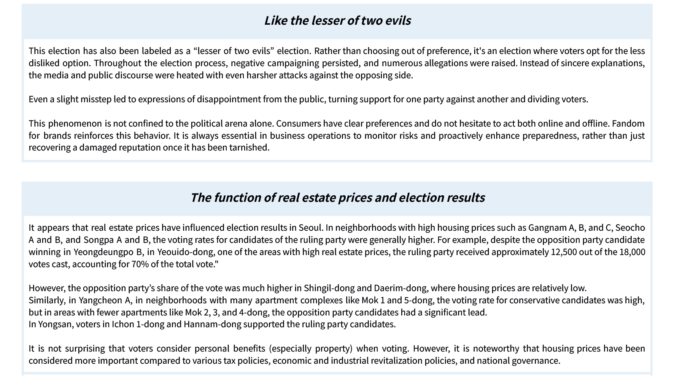

Concluding the report on the 22nd General Election of the Republic of Korea, we want to share three insights with those who are leaders or aspire to be a successful leader.
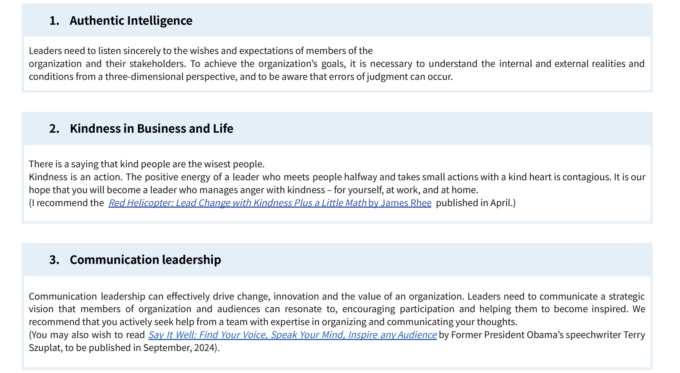

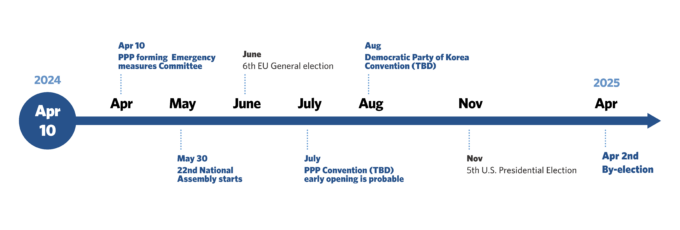

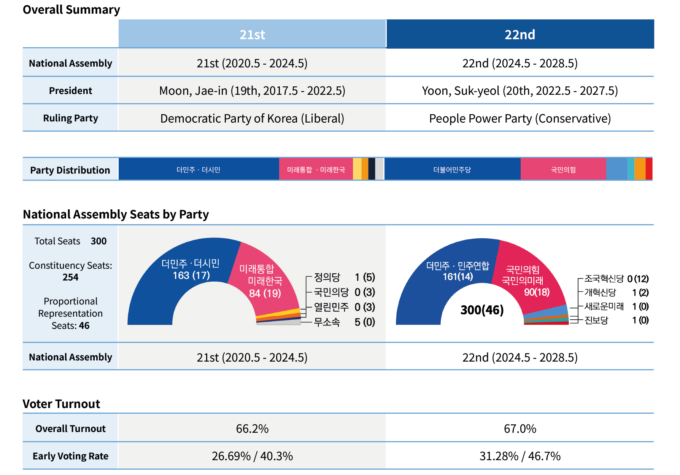
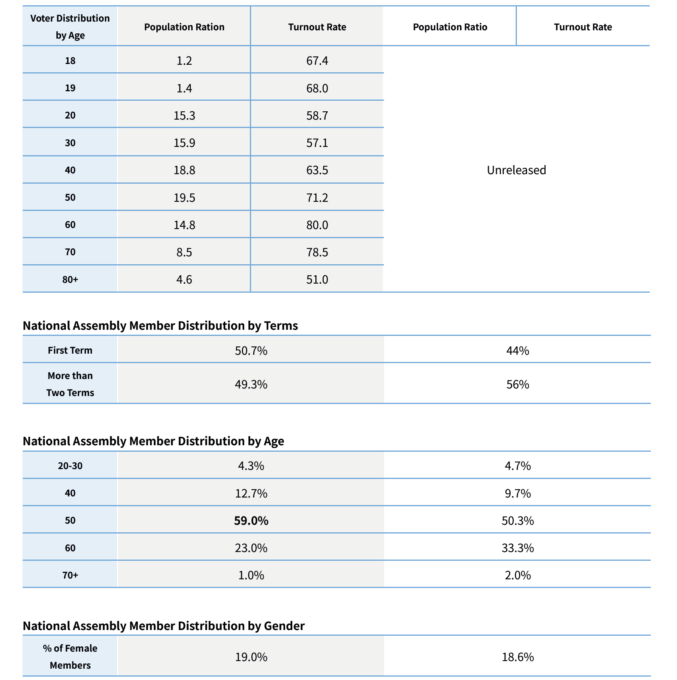

Download: [FH] 2024 South Korea General Election Newsletter.Eng
Find Out More
-
Adaptability the new imperative with tariff deal
August 5, 2025
